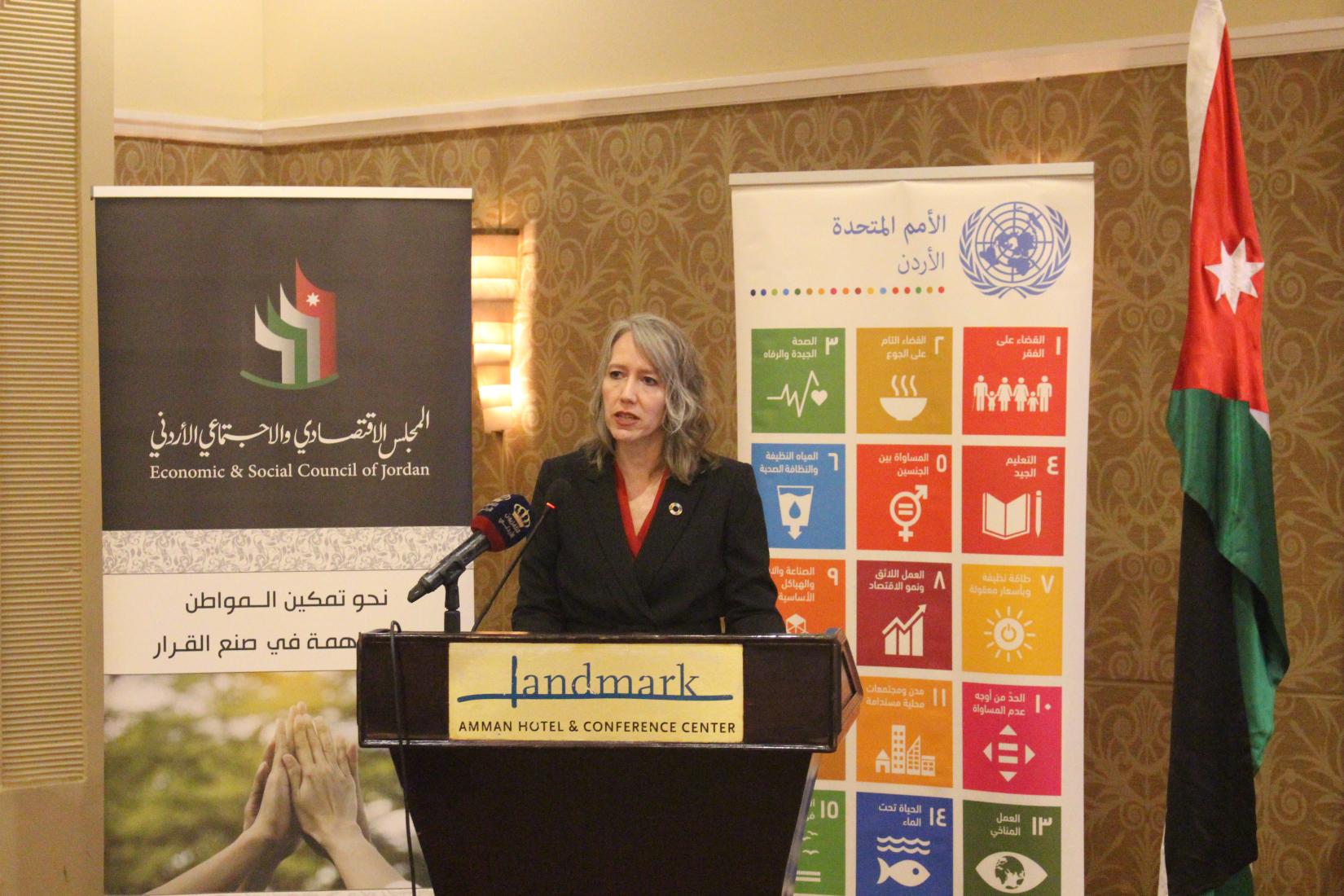UN Resident Coordinator in Jordan, Sheri-Ritsema Anderson's remarks on the launch of policy brief “Domestic Resource Mobilization- a human rights-based approach to tackling inequalities”
Excellencies,
Ladies and gentlemen,

Thank you for joining us this afternoon.
I am pleased to have the honour of joining Professor Shteiwi today and wish to publicly thank him for his leadership and for the excellent collaboration that exists between the United Nations and ECOSOC in Jordan.
Having recently arrived as the highest representative of the United Nations to Jordan, deployed by the UN Secretary-General to coordinate the work of the UN on sustainable development and to leverage the full capacity of the United Nations in support of Jordan’s efforts to achieve the sustainable development goals, it is my particular honor to address two events today that support the national reform processes initiated by His Majesty King Abdullah II in his modernization vision. These also align with the 2030 Agenda for Sustainable Development.
The first event was this morning, where I joined H.E. Musa Maaytah, the Chair of the Board of Commissioners at the Independent Electoral Commission, in launching a UN programme that will support the Commission in strengthening effective, transparent, fair, and inclusive institutional and operational electoral processes in support of the Political Modernization Process and upcoming parliamentary elections.
Now, in this second event, I have the pleasure of joining Professor Shteiwi in launching a policy brief which was jointly initiated between the Economic and Social Council of Jordan and the United Nations in support of the Economic Modernization Vision.
The policy brief seeks to highlight the importance of mobilizing the necessary resources to realize the 2030 Agenda for Sustainable Development and its 17 Sustainable Development Goals – also known as the SDGs – while applying a human rights-based approach.
As you know, globally, we are falling dramatically behind in realizing the SDGs.
Last year, the Kingdom of Jordan submitted to the High-Level Political Forum in New York a Voluntary National Review report assessing its progress in achieving the SDGs.
The report noted that among the greatest areas of progress were in the SDGs that aim to eliminating hunger, ensuring quality education, and access to clean water and sanitation. The Government’s report also noted that the areas of least progress was on the SDG related to decent work and economic growth, as well as the SDG on reducing inequalities.
For over a year, the United Nations has been sounding an alarm on the insufficient global progress on the SDGs. Inflation, rising interest rates, looming debt burdens, and exponential increases in the cost of financing are causing us to lose ground. Growing inequalities, lack of global solidarity, and a need to reform global financial system further undermine our progress. UN Secretary-General, António Guterres, repeatedly urges the world “to rescue the SDGs.”
A human rights-based approach could help.
Why?
Human rights range from the most fundamental - the right-to life - to those that make life worth living, such as the rights to food, water, education, work, health, and liberty.
A human rights economy seeks to redress root causes and structural barriers to equality, justice, and sustainability.
This would be achieved by increasing investment in social protection, and quality education and healthcare for all; access to justice and the rule of law; and effective climate and environmental action.
The policy brief we are introducing today recommends investment in these areas, and a repositioning of public expenditure.
It also recommends a review of all economic and fiscal policies on their impact on human rights, which identify areas of success in the Kingdom, as well as areas where additional improvements are needed. It would give the Government additional knowledge and tools needed to ensure that economic policies as well as business models are guided by human rights standards.
Lastly, the policy brief encourages that the human rights principles of participation, transparency and accountability be applied in the design of more redistributive, fair and just fiscal policies and budget processes.
Why should we do this, you might ask? What do we gain?
Among other deliverables, such an approach would give the public and civil society greater information on where investments are being made, which would further increase trust in Government. It would also maximize the effectiveness of policies, which in turn will advance our collective work to ensuring no one in Jordan is left behind as the Kingdom continues its path towards development and modernization.
This year marks the 75th anniversary of the Universal Declaration of Human Rights. We hope that in this important year where we rejuvenate the Declaration, demonstrate how it can meet the needs of our time AND advance its promise of freedom, equality and justice for all, this policy brief can contribute to advancing a human rights-based approach on economic and fiscal policies in Jordan.
Thank you.


